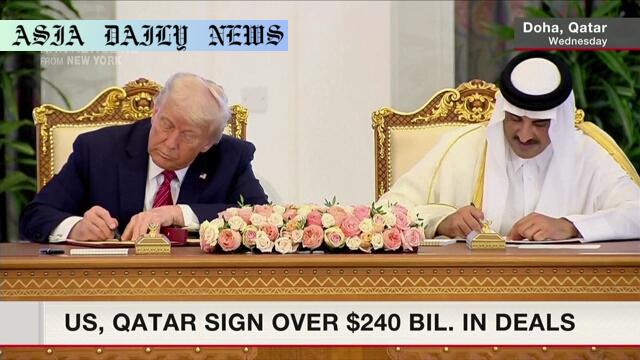Qatar and the US partnered on a historic $240 billion in agreements, including aircraft orders and advanced defense systems.

Historic Partnership: US and Qatar Forge $240 Billion Agreements
The recent partnership between the United States and Qatar has set a remarkable benchmark with more than $240 billion in agreements. Strengthening bilateral ties, the collaboration spans cutting-edge aviation and defense systems, showcasing the powerful alliance between these nations. This development marks a significant step in economic and strategic growth, focusing on trade expansion, technological innovation, and defense modernization.
A standout facet of the deal is Qatar Airways’ substantial investment in the aviation industry. The Gulf country committed to purchasing 210 Boeing aircraft, setting a record for the largest order in the history of Boeing. President Donald Trump notably praised this milestone, hailing it as a critical win for American manufacturing and the aviation sector. This single order promises to create thousands of jobs in the United States while equipping Qatar with state-of-the-art passenger and cargo carriers, reaffirming mutual economic benefits.
Defense Modernization: Strengthening Qatar’s Security
The agreements also include substantial advancements in Qatar’s defense capabilities. Qatar has finalized its acquisition of advanced American weapons systems tailored to combat and neutralize modern threats, such as drones. The Gulf nation views this investment as crucial in bolstering its strategic defense, particularly in a region fraught with geopolitical challenges. For the US, this deal represents a significant export of military-grade technology, further cementing its role as a leading global arms supplier.
Broader Impacts: Geopolitical Discussions and Stabilization
The partnership goes beyond trade and defense. President Trump and Qatar’s Amir Sheikh Tamim bin Hamad Al Thani explored global issues such as the ongoing conflict in Ukraine and increasing tensions in Iran. These discussions demonstrated a shared commitment to stability and peace in increasingly volatile areas. Qatar’s involvement in facilitating solutions to global challenges underscores its role as a key mediator in the Middle East and beyond.
A Regional Powerhouse in Transformation
Qatar’s ambitious deals with the United States signal a broader strategy to solidify its role as a dynamic economic and political powerhouse in the region. Beyond economic benefits, the agreements strengthen Qatar’s ability to secure its borders and safeguard its regional interests. Meanwhile, on a global stage, the US emerged from these negotiations showcasing its capability to cultivate critical alliances that foster global stability and economic opportunities.
Key Takeaways for Global Partners
This historic partnership between the US and Qatar offers critical takeaways for global stakeholders. It underlines the importance of mutually beneficial trade and defense agreements while emphasizing collaboration to address pressing global challenges. Allies worldwide can look to this example to formulate strategies fostering peace, economic stability, and innovation, driving collective progress in an interconnected world.
Commentary
The Significance of Strategic Partnerships in a Globalized World
Strategic partnerships like the one recently signed between Qatar and the United States demonstrate the transformative power of diplomacy and mutual collaboration. A deal totaling over $240 billion is not just about numbers—it illustrates a deep commitment to fostering economic prosperity, technological advancement, and global security. Such deals highlight how nations can come together to achieve greater goals that benefit both sides substantially.
Economic Growth Through Bilateral Agreements
Qatar’s investment in the US aviation industry, particularly through the record-breaking order of 210 Boeing aircraft, represents a pivotal step for the economy. On one hand, it provides Qatar with technologically superior aircraft that meet current and future needs in both passenger and cargo transport. On the other, it generates thousands of jobs for Americans and reinforces the centrality of the aviation industry in global trade and connectivity. This deal exemplifies the positive ripple effects that strong bilateral agreements can have across industries and countries.
Strengthening Defense Alliances in a Volatile Region
By focusing on acquiring advanced weapons systems from the United States, Qatar is hedging its bets against rising security threats in the Middle East, including drone warfare. This modernization of its defense arsenal is a clear message to adversaries about Qatar’s readiness to safeguard its sovereignty. Simultaneously, it affirms the United States’ position as a reliable technology and arms provider globally. Such deals are instrumental in ensuring stability in regions prone to constant upheavals, a common goal for both countries.
Collaboration Beyond Economics: A Broader Scope
What stands out is the emphasis on addressing global challenges, including the Ukraine conflict and the ongoing shifts in Iran’s geopolitical landscape. Such discussions reaffirm the importance of diplomacy and multilateral dialogue in resolving international crises. By engaging in these critical matters, Qatar is portraying itself as a mediator and active participant in global peacekeeping efforts, ensuring that its voice is heard on the international stage.
A Perfect Blueprint for Future Collaborations
In summation, this strategic US-Qatar partnership offers a perfect blueprint for other nations to emulate in future collaborations. It underscores the dual importance of expanding economic ties and addressing global security challenges collectively. Partnerships of this scale are not merely transactional; they are transformative, capable of reshaping relationships, industries, and economies across the globe. The success of such agreements reminds us how essential collaboration is in an increasingly interconnected world.


